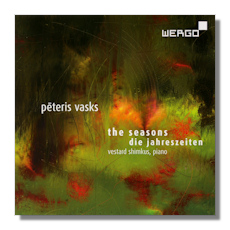
The Internet's Premier Classical Music Source
Related Links
- Vasks Reviews
- Latest Reviews
- More Reviews
-
By Composer
-
Collections
DVD & Blu-ray
Books
Concert Reviews
Articles/Interviews
Software
Audio
Search Amazon
Recommended Links
Site News
 CD Review
CD Review
Pēteris Vasks

Piano Works
- The Seasons (Gadalaiki)
- Summer Evening Music (Vasaras vakara muzika)
Vestard Shimkus, piano
Wergo WER6734-2
The Latvian composer, Pēteris Vasks (born 1946) is best known for his lush, evocative and at times sumptuous orchestral and chamber music. How, someone unfamiliar with The Seasons for solo piano might wonder, does he work his magic (for Vasks' is a unique style of composition) with one keyboard? Does Vasks, indeed, intend to construct the same sound world at all? How successful is it? And how should a skillful pianist reproduce such music?
In the first place, it is to Vasks' great credit that what we hear in The Seasons is as original and imaginative as are his fully-scored works. It's also to the credit of Vestard Shimkus (also Latvian, born in 1984, and whose only CD this appears to be) that he conveys the music's essence so effectively. He does this in three ways: by playing with great sensitivity as much to its dynamics as its harmonies. By calling on a courage never to rush… there are some slow passages, redolent of a cross between Liszt, Scriabin and Feldman; Shimkus gives them all the room they need. And by starting with an intensity which is never manufactured, but which originates simply in the music, and seems to return the emotion that it generates into the world evoked by Vasks.
In understanding The Seasons as well as he does, in fact, Shimkus appeals not only to the notes as written, but beyond them to Vasks' attachment to the spiritual, to his belief that Nature, in particular, can, does (and must?) inform the creative process – and be respected in the way we live our lives. In that sense, The Seasons is not "about" the seasons. It's a reflection of them, of our experience of them and of our assessment of the many significances which they have in our lives. So Shimkus' playing is successful because he's as conscious of Vasks' inspirations for this work as he is of it as an artefact.
Lutoslawski was a huge influence on Vasks, indeed, the latter had to "work out" (to "purge", almost) this and other after-effects of the Polish avant garde. But for Shimkus, awareness of the work of Lutoslawski, whose own piano music still has similarities with The Seasons, is an advantage. Particularly in that it's essentially abstract music… words run the risk of "ideological control", as Vasks has put it. Shimkus' playing is gentle, considered and ethereal, without ever losing impetus or focus. Much of The Seasons is notated without bar lines. It is notated, though: Shimkus' achievement is to make it sound in places consequently improvisatory (as does some late Schubert) yet highly purposeful. The pauses, delayed uptakes and changes in tempo during the second half of the autumn movement [tr.4] are good examples of this. Time has passed. You're aware that this is not the same music as began either the movement or the cycle. But – like Nature itself – there is constancy and comfort… in change as much as in stasis. The predominantly slow character of The Seasons invites reflection and self-awareness, rather than a response to a description, a tone painting. Also successful is Shimkus' emphasis on the solo nature of his piano playing. There is no attempt to have the piano take on the role of an orchestra manqué. This is mostly quiet, solitary, intense music whose melodic lines say as much as does the instrument's timbre.
The Seasons is, of course, in four parts, although is in no sense program music. Indeed, the movements are entitled (in translation) "white scenery", "spring music", "green scenery" and "autumn music". The first was composed (in 1980) initially without any plan that it would be part of a cycle. Then followed the autumn music a year later. It was actually Vestard Shimkus' playing (in 2004) of "spring music" (the most difficult of the four pieces) after it was written (in 1995) that prompted Vasks to complete a cycle as such; he composed the "summer music" at that time and suggested the order from winter to winter again, as most appropriate for a Baltic composer.
Vasks also wrote the short (barely six minutes) "Summer Evening Music" in 2009 as a kind of encore for the performance, and player. It's heard at the end of The Seasons on this CD. The acoustic is not close, there is perceptible distance between performer and listener. This serves to confer great dignity and gravitas on the performance, which was actually taken from a live recording. Much to be welcomed – especially if Vasks' is primarily an orchestral composer for you. As with all but a handful of Vasks' works, this is the only recording. But it's not lacking in any way. Devotees of the composer, the curious and aficionados of contemporary piano music in general will all find much here to stimulate, delight and satisfy.
Copyright © 2011, Mark Sealey.




















